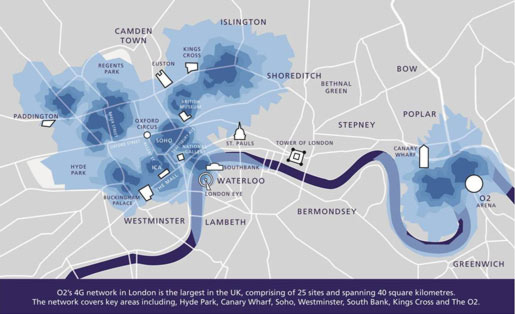Data connection speeds of up to 150Mb/s have been enjoyed by the thousand or so people taking part in O2’s 4G trials in London’s West End and O2 Arena areas. However O2 say the speeds to end users in practice will average out around 30Mb/s. These are speeds are still well in excess of many computer users fixed broadband connections. 3G mobile broadband speeds are currently available up to 7.2Mb and 3G HSPA+ devices can achieve download speeds over 10Mb/s in the UK according to Three.

The trial started in December last year. O2 and other firms are getting their networks ready for using the 800MHz spectrum, freed up in London today by the switching off of Analogue TV signals. So how were the 4G trials conducted if the analogue signals were still using the bandwidth? Well, they used the 2.6GHz frequency band which was supposed to be used as 3G Expansion a few years back but was left unused due to legal wrangling between networks! Both the 800MHz and 2.6GHz bands are going to be auctioned off to operators through Ofcom, then the 4G services should be available from mobile networks next year, all being well.
Ronan Dunne, CEO of O2, asserted that the 4G services will offer huge benefits to consumers and businesses. He said "The forthcoming spectrum auction is a watershed moment for the UK mobile industry, releasing the airwaves that will power a whole range of exciting next generation mobile services. The new spectrum will increase capacity, quality and speed (we estimate that mobile broadband capacity will increase by 20 to 40 times from today's levels), and will allow us to deliver true connectivity through a suite of innovative digital services."
Interestingly the users in the O2 4G trials have averaged downloads of 200Gb per month with their smartphones and dongles. Conversely I’ve seen more and more smartphone contracts offered with less and less data, a choice of 1Gb or 500Mb per month was common a year or so ago, this year I’ve seen quite a lot of contracts with 250Mb or even 100Mb allowances. Hopefully that is more about phone contract price points than the current networks choking on too much data transfer.













